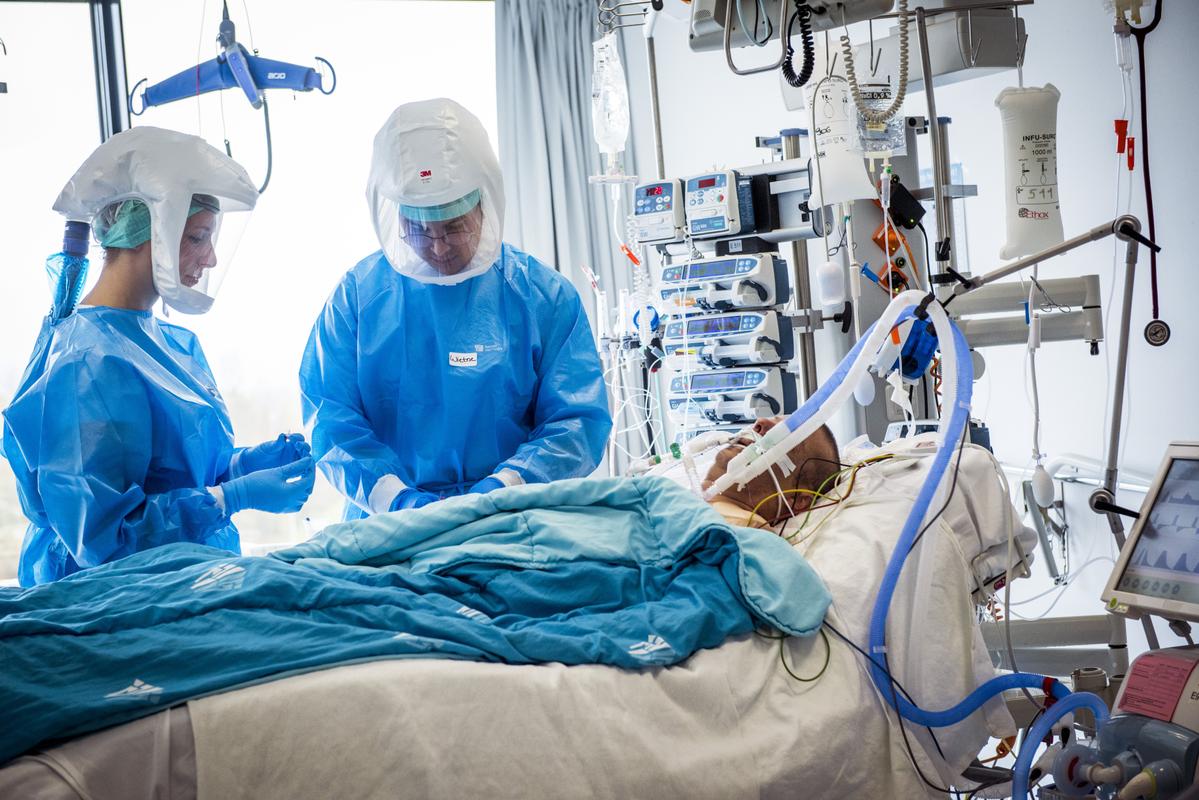It is now commonly known that it is predominantly the intense immune reaction of the body which causes serious COVID-19 cases. In the first phase of the illness, the nasal and lung mucosa are infected with the coronavirus potentially giving the patients flu-like symptoms, such as fever. After that it is especially the reaction of the immune system to the infection that determines whether people hardly have symptoms, develop a milde case of the illness or require hospital admission and in the worst case end up on a ventilator on an intensive care war. To better understand what goes wrong in the immune system of people with a serious case of COVID-19, thorough research is required. Only with this information doctors will be able to act appropriately and give the correct medication.
Prof. dr. Joost Wauters, intensivist in UZ Leuven: “Because COVID-19 was an unknown illness, doctors had to decide on treatments based on hypotheses, and not based on direct and thorough observations in COVID-19 patients. This can cause problems, as we have seen in the controversy surrounding chloroquine. Despite the use of anticoagulants and cortisone, there are still people on intensice care wards dying from serious COVID-19 infections. Our research is providing new insights based on immunological examinations in a large number of patients, not based on research in lab animals or in the lab.”
Our research now provides new insights based on thorough immunological examinations in a large number of patients.Prof. dr. Joost Wauters - intensivist UZ Leuven
Immunological atlas
This observational study, which falls under the CONTAGIOUS research project, examined both patient with a mild case of COVID-19 and seriously ill patients. In total the lung fluid of 44 patients was analysed. Research into lung fluid is very exceptional in COVID-19: until now most trials were limited to blood samples which are easy to take and analyse, but do not always reflect the correct clinical picture in the lungs. Which is why this trial gives unique insight into the immunological cells of the infected lung.
With the help of the newest technologies, the trial checked which genes were expressed in the many thousands cells of the lung fluid. The analysis of this ‘transcriptome’ reveals a wealth of information. In combination with other techniques it was also possible to accurately map the different immunological cell types during the disease progression of COVID-19, thus in fact creating an immunological atlas. This atlas provides the following noteworthy observations.
Monocytes without impact
Prof. Diether Lambrechts, associated to the VIB and KU Leuven: “The lung fluid immediately revealed the that monocytes – white blood cells produced by the bone marrow – are at the base of intense inflammation reactions and subsequent 'cytokine storms' in critically ill COVID-19 patients. We also saw that the monocytes in these patients did not succeed in transforming into a different type of immune cells, the so-called macrophages. The runaway monocytes caused further inflammation damage in the lung leading to irreparable scarring. Differentiation from monocyte into macrophage does happen in patients with a mild case of the disease, in which case the macrophages help eliminate dead and infected cells and help form antibodies. Thanks to these unicellular analyses we were able to identify new targets that can stimulate the formation of macrophages and reverse the body's intense reaction as a new treatment for critically ill COVID-19 patients.”
Exhausted T- and B-cells
Furthermore, the analyses of the lung fluid also showed that other defence cells, such as T-cells and B-cells, no longer function in their usual manner. Some T-cells, such as the T-helper-17, can no longer develop sufficiently in critically ill COVID-19 patients. Other T- and B-cells are instead being over-activated, thus exhausting themselves, making them ineffective. It is therefore only logical that patients have difficulty recovering from the disease, because T- and B-cells are absolutely vital for overcoming the virus in the body and for channelling the immune reaction correctly.
Now we understand better what goes wrong in critically ill COVID-19 patients.Prof. dr. Els Wauters - pulmonologist at UZ Leuven
Search for new medication
The new insights gained from these and other ongoing CONTAGIOUS trials are very important for pharmaceutical companies and labs that are currently searching for new medication for COVID-19 patients. For now, critically ill patients only seem to be helped with anicoagulants, anti-inflammatory drugs such as dexamethason and, in the very early stages, also remdesivir. The immunological changes described in the trial, are especially interesting for finding new anti-inflammatory and immunoregulatory medication, but could also be uses as a frame of reference for developing other antiviral medication and vaccines.
Prof. dr. Els Wauters, pulmonologist at UZ Leuven: “Now we understand better what goes wrong in critically ill COVID-19 patients. What's more, the new therapeutic targets can now be validated in lab animals infected with the coronavirus, in collaboration with professor Johan Neyts at KU Leuven. Other existing immunoregulatory medication already being used for other diseases are now also coming into view for clinical validation for COVID-19 as so-called 'repurposing drugs'. In addition, many other international researchers will be able to use our data and build upon them, and vice versa we will check their ideas against our data. The data we have collected are unique: at this point we have examined the lung fluid of the largest group of COVID-19 patients with pneumonia. The involvement of prestigious KU Leuven labs within the CONTAGIOUS consortium is also an immense added value to analyse these extremely contagious samples. And we have also been able to make use of the VIB's single-cell expertise, so we can say that our results are of great relevance worldwide.”


